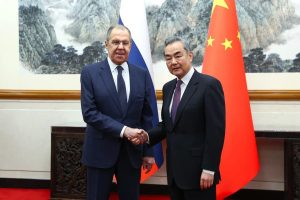As U.S. President Joe Biden hosts Japanese Prime Minister Kishida Fumio for a state visit, and prepares for a historic trilateral summit also including the Philippines’ President Ferdinand Marcos Jr., China is emphasizing its own partnerships. On April 8, the same day Kishida arrived in Washington, D.C., Russia Foreign Minister Sergey Lavrov began a two-day trip to Beijing. On April 11, the same day Biden, Kishida, and Marcos will gather at the White House, China is sending its third-ranking leader to North Korea.
Despite China’s consistent claims that the China-Russia relationship does not target third parties, countering the United States was the not-so-subtle subtext of Lavrov’s visit. “Our two countries need to firmly oppose all moves of unilateralism and hegemonism,” Chinese Foreign Ministry spokesperson Mao Ning said in summarizing the discussions. Washington is the main target of Chinese accusations of “unilateralism and hegemonism.”
Mao particularly highlighted that “Russia’s presidency of the BRICS group this year and China’s presidency of the SCO [Shanghai Cooperation Organization] in the second half of this year provide an opportunity to cement coordination and strategic collaboration on multilateral platforms…” Cooperation between China and Russia on the international stage has been a major theme of their relationship. The week before Lavrov arrived, China and Russia held deputy foreign minister-level talks on coordination at the United Nations and U.N. Security Council.
While China insists that its relationship with Russia is not a formal alliance, both sides have spoken about China-Russia ties reaching an “unprecedented high level” in recent years. During his talks with Chinese Foreign Minister Wang Yi, Lavrov made the comparison explicit, saying current ties have even “surpassed the Cold War military alliance.”
Lavrov was also granted an meeting with Chinese President Xi Jinping, who typically does not meet with foreign ministers (though he also made an exception for U.S. Secretary of State Antony Blinken’s first trip to China in June 2023). Xi too urged cooperation on the international stage, exhorting China and Russia to work together to “unite the countries of the ‘Global South,’ promote reform of the global governance system, and actively lead the construction of a community with a shared future for mankind.”
While none of the official Chinese readouts mentioned Korean Peninsula issues specifically, Wang and Lavrov may also have exchanged notes on their approaches to North Korea, given the upcoming trip to Pyongyang by Politburo Standing Committee member Zhao Leji. Zhao, who is also the chair of the National People’s Congress Standing Committee, will be visiting North Korea from April 11-13 “to pay an official goodwill visit and attend the opening ceremony of ‘China-DPRK Friendship Year.’”
According to Mao, the Chinese Foreign Ministry spokesperson, the trip “reflects the deep friendship between the two countries and the great importance China attaches to its relations with the DPRK,” the formal name for North Korea.
“We believe that with the joint efforts of both sides, the visit will be a full success and further deepen bilateral ties,” Mao added.
Zhao will be the highest-ranking Chinese official to visit since North Korea shut its borders during the pandemic, ending even diplomatic exchanges. Xi Jinping himself visited Pyongyang in 2019, but since then, China has fallen noticeably behind Russia in exchanges with North Korea.
Lavrov and Russian Defense Minister Sergei Shoigu both visited North Korea in 2023, and Supreme Leader Kim Jong Un visited Russia in September 2023. Meanwhile, Wang Yi hasn’t been to the country since 2019. Prior to Zhao’s visit this week, the highest-ranking Chinese official to visit North Korea in the past five years was Vice Premier Liu Guozhong, who made a trip to Pyongyang in September 2023 to attend celebrations marking the 75th anniversary of North Korea’s founding. Vice Foreign Minister Sun Weidong also visited Pyongyang in January 2024.
Even on people-to-people exchanges, Russia has nudged China aside. A plane full of Russians marked North Korea’s return to hosting international tourists, though most analysts had expected Chinese tourists would be the first to return.
A number of analysts have speculated that China, Russia, and North Korea are forming a trilateral partnership to counter the United States’ own strengthening network of minilateral groupings in the region – including the Japan-Philippines-U.S. trilateral to meet tomorrow, as well as the Japan-South Korea-U.S. trilateral, the Quad, and AUKUS.
However, others have suggested that China’s slow-rolling of diplomatic exchanges with North Korea – at least compared to the frenetic pace of Russia-North Korea meetings – represents a certain reluctance on Beijing’s part. Moscow is in desperate need of the ammunition and military exports North Korea can supply to continue its war in Ukraine; for Beijing, the cost-benefit analysis of a close partnership with Pyongyang is less clear. North Korea has little to offer in advancing Beijing’s goal of reforming the international order, nor can it contribute much to bolstering China’s flagging economy.
In that context, Zhao’s trip to North Korea is noteworthy, as it could signal an increased willingness in Beijing to openly embrace a partnership with Pyongyang – and potentially a trilateral arrangement that also includes Russia.

































